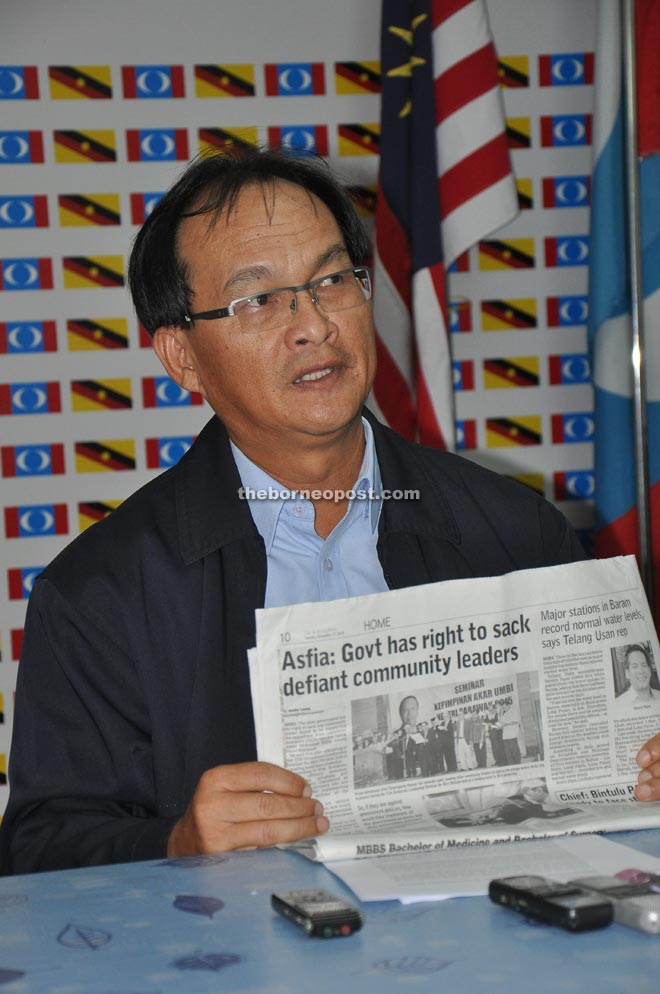
Baru showing the newspaper article of Asfia’s recent veiled threat that the government
had the right to sack community leaders who were supportive of the opposition.
KUCHING: Ba Kelalan assemblyman Baru Bian has asked State Legislative Assembly (DUN) speaker Datuk Amar Mohd Asfia Awang Nassar and other government leaders to ponder why community leaders, or anyone, would want to support the opposition?
Baru, who was extremely disappointed with Asfia for his recent veiled threat that the government had the right to sack community leaders who were supportive of the opposition, said people did not oppose for the sake of opposing, but because of policies that were wrong and detrimental to the people.
As an example, he asked how a community leader could be expected to support the government’s proposal to extinguish his or her community’s native customary rights over land to build a dam that would deprive them of their livelihood and destroy their way of life.
“Why should a community leader do that? It is my opinion that supporting any political parties is a constitutional
right of any Malaysian citizen including community leaders. Therefore, a community leader cannot be sacked for exercising his right under the law of this country,” he said in a press conference here yesterday.
“Community leaders were the bridge between the people and government, and that is still their role. They are not supposed to be the government in the field, contrary to what the speaker said, although one of their duties now is to ‘assist generally all officers of the government and local authority in the execution of their public duties’, as stated in the Community Chiefs and Headmen Ordinance 2004.”
He said the government destroyed the age-old traditional role of community headmen when it passed the Community Chiefs and Headmen Ordinance 2004 to give itself the power to appoint community leaders, thereby depriving the people the right to choose their own leaders.
“It appears therefore that the underlying purpose for passing this Ordinance was to control headmen and through them, their entire communities. By so doing, the government has effectively emasculated the once proud and fiercely independent native communities of Sarawak.
“The government-appointed community leaders are now seemingly controlled by inducement in the form of allowances and by threats of dismissal. Instead of representing the community, they now represent the government. Do people realise what the government has done?”
Baru argued if the community leaders were indeed representatives of the government, then the communities were effectively leaderless, adding that the government, in one fell swoop, destroyed their custom and stripped them of their independence and democratic rights.
He said Sarawakians were now beginning to call for their rights under the Malaysia Agreement to be recognised by Peninsular Malaysia, and was pleased that Chief Minister Datuk Patinggi Tan Sri Adenan Satem had taken up many demands, which the opposition had highlighted.
“However, I hope the Chief Minister and his ministers realise that in the matter of community leaders, they are no different from their BN counterparts in Peninsular Malaysia with regard to safeguarding the rights of the people of Sarawak.
“Why say they are fighting for the rights of Sarawakians when they are doing exactly what they accuse the federal government of doing, such as depriving the people of their birthright?”
Baru said one could argue that what the state government had done to the native communities was even more insidious because it had completely changed the dynamics of the rural communities and sown distrust and divisiveness where there was once pride in their unity.
“The Community Chiefs and Headmen Ordinance 2004 is an ordinance that can be abused and therefore needs to be reviewed and amended. I am aware that in fact, certain provisions of the Ordinance are positive, such as section 8(1)(a) which expressly prohibits any appointed chiefs or headmen from holding any post in a political party.
“This means that they are supposed to be apolitical. However, it is a common knowledge that many of these headmen are in fact holding posts in BN component parties and are part of the BN machinery. This should not be allowed.”
Baru said the traditional custom of appointment of community leaders must be restored so that communities could regain their independence and pride, adding that given the chance, the opposition would restore the rights of the people to their traditions and customs.
